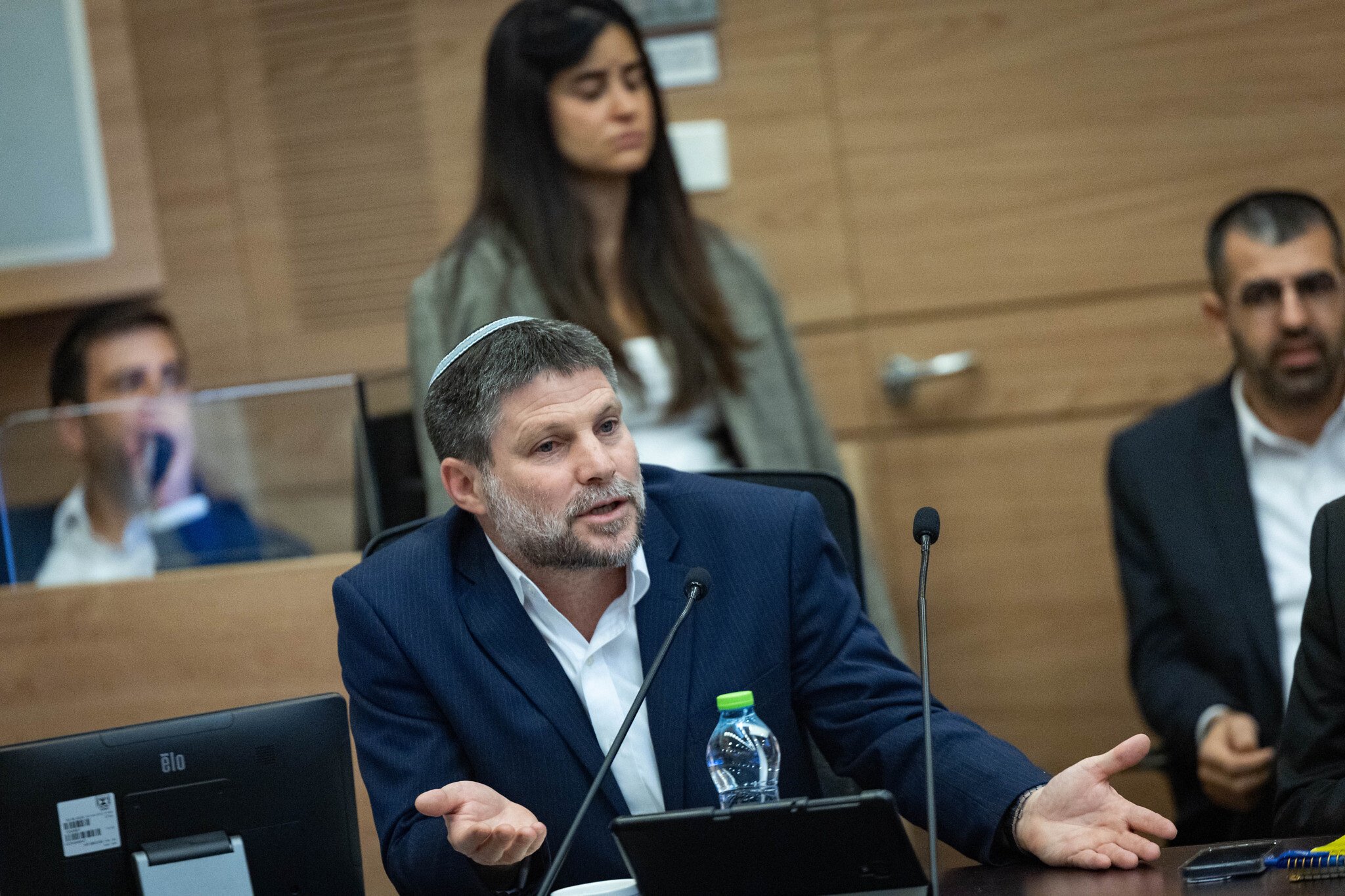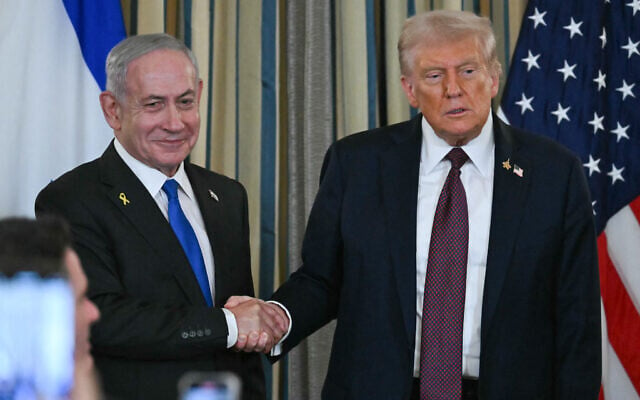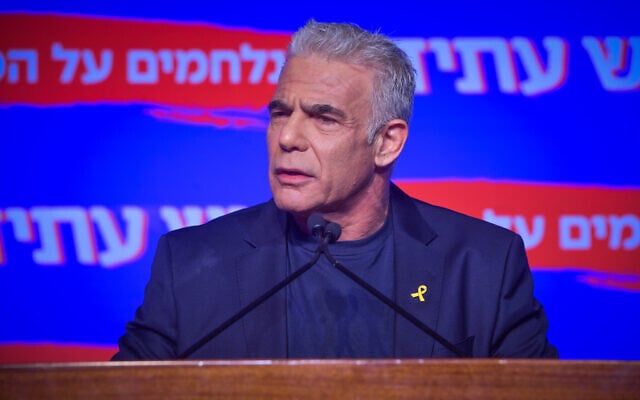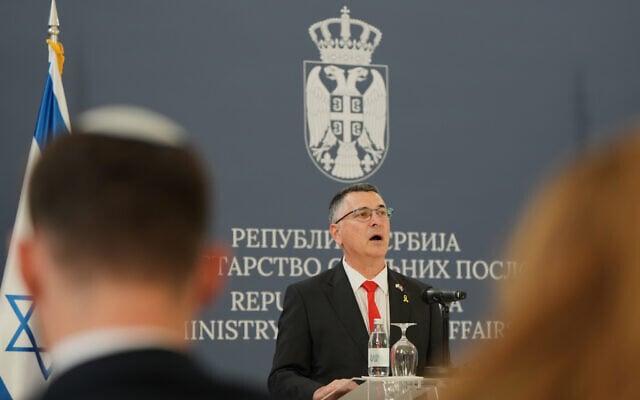


Finance Minister Bezalel Smotrich slammed a US-led plan to end the war in Gaza as a “resounding diplomatic failure” in a lengthy social media post on Tuesday but stopped short of saying outright that his party would try to torpedo it.
The post was a rare note of criticism amid a chorus of Israeli and international praise for the plan, which US President Donald Trump unveiled on Monday at a White House press conference alongside Prime Minister Benjamin Netanyahu. Netanyahu said he accepted the plan and has since defended it against criticism from the right — vowing not to allow the establishment of a Palestinian state or to fully withdraw Israeli troops from Gaza.
Hamas, according to reports on Tuesday, is examining the proposal and will deliver its response in a matter of days, after meeting with representatives from Turkey and Qatar. The deal calls on the terror group to disarm, which it has refused to do in the past, as well as release all of the Israeli hostages it is holding within three days, in exchange for an immediate end to the war.
Hamas’s acceptance of the terms would be key to fulfilling the agreement in its entirety. CBS News reported on Tuesday that Hamas is leaning toward accepting the terms of the plan, citing an unnamed source “close to the process.”
But within the Israeli political sphere, the reactions of Smotrich and National Security Minister Itamar Ben-Gvir, both far-right partners of Netanyahu, are being closely watched. Either can collapse the Netanyahu’s government over the plan, and both have previously threatened to leave the coalition over ceasefire deals.
Ben-Gvir has yet to publicly weigh in on the deal. In a lengthy post on X, Smotrich, who heads the hardline Religious Zionism party, called celebrations over the plan premature, criticizing the scheme as giving up “real achievements on the ground for political illusions, and submitting to a diplomatic bear hug and glittering ceremonies.”

The finance minister wrote that the plan — which calls for an Arab-led security force and an independent Palestinian government to manage affairs in Gaza — marks a return to an era of Israeli-Palestinian peace talks that he firmly opposes.
In the wake of the Hamas-led October 7, 2023, attack that launched the war, Smotrich has called for Israel to occupy and resettle Gaza, which he has said is “inseparable” from Israel.
The deal, he wrote, is a “historic missed opportunity to finally break free from the shackles of Oslo, a resounding diplomatic failure, closing our eyes and turning our backs on all the lessons of October 7.”
He added, “In my estimation, this too will end in tears,” and said the situation was a “tragic case of leadership abstaining from any vision.”
While Smotrich expressed hope that Hamas’s “obstinacy” would scuttle the deal, he did not say whether he would do so himself by withdrawing his party from Netanyahu’s coalition. On Monday, he said that he had informed the prime minister of his party’s “red lines” ahead of the premier’s meeting with Trump to discuss the plan.
“[Given] Prime Minister Netanyahu’s initial unwillingness to conquer Gaza… is this the maximum that can be achieved right now?” he asked in the post. “These are good questions. We will consult, consider, and decide, with God’s help.”

Even if Smotrich and Ben Gvir bring down Netanyahu’s government, he would still almost certainly have a parliamentary majority in favor of the agreement. A chorus of opposition figures, from liberal to hardline, have praised the plan since it was published.
Yair Golan, leader of the left-wing Democrats alliance, said the deal is in the “spirit” of his party. Avigdor Liberman, chair of the hardline Yisrael Beytenu party, posted that “every initiative that brings all the hostages home must be welcomed.”
Naftali Bennett, the former prime minister now mounting a political comeback, called the plan “a difficult, but necessary step” given the price Israel has paid over two years of war.
Opposition Leader Yair Lapid also came out in support of the plan.
“The 20-point plan that Donald Trump presented yesterday is not perfect, but it is the best option on the table,” Lapid posted. “We’ve squandered a tragic year of personal and national disasters, a year when hostages have died and soldiers have been killed as our international standing is disintegrating before our eyes. Time has run out.”
But Lapid added that Netanyahu could still torpedo the deal now that he was back in Israel.
“He usually says ‘yes’ in Washington, when he stands in front of cameras in the White House and feels like a groundbreaking statesman, and the ‘but’ when he returns to Israel and the ‘base’ reminds him who’s boss,” Lapid wrote.
Netanyahu appeared to be responding to critiques from right-wing voters. On Tuesday, he posted a brief video in which he responded to questions about the plan, assuring viewers that the IDF would be able to remain in Gaza and that the plan does not commit Israel to establishing a Palestinian state.
“It was a historic visit,” he said. “Instead of Hamas isolating us, we turned things around and isolated Hamas.
“Now the whole world, including the Arab and Muslim world, is pressuring Hamas to accept the terms that we created together with Trump, to bring back all the hostages — the living and the dead — while the IDF remains in the Strip.”
His remarks appeared to misrepresent a portion of Trump’s plan, which was published online by the White House. The plan does not envision the IDF remaining in Gaza indefinitely, but rather withdrawing gradually and handing over the reins to an international security force.
In response to a question as to whether the plan mandates a Palestinian state, Netanyahu said, “Absolutely not. It’s not written in the agreement.” The agreement does leave the door open to a Palestinian state in the future, though it does not guarantee one.
“We said we would strongly oppose a Palestinian state,” he added, claiming Trump agrees with him that Palestinian statehood would be a “massive prize for terrorism.”

Some of Netanyahu’s lieutenants also praised the plan. Tourism Minister Haim Katz, a member of the prime minister’s Likud party, posted on X that the deal means “the return of all the hostages, the removal of every existential threat, and a generation of peace for Israel’s children in any way and as soon as possible.”
Foreign Minister Gideon Sa’ar, meanwhile, said while on a diplomatic visit to Serbia that Israel’s acceptance of the deal “shouldn’t surprise anyone,” as Israel remains “committed to the goals that we set” for the war, which include destroying Hamas’s military and governing capacity, freeing the hostages, and ensuring Gaza doesn’t pose a future threat to Israel.
Sa’ar said he was skeptical as to whether Hamas would agree to the deal’s terms.
“We know, based on the past, that they usually want to open and close, try changing the terms, and to escape from implementing,” he added. “But we will see.”

